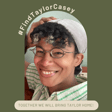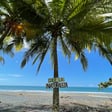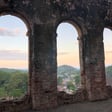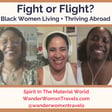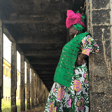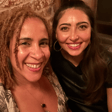Become a Creator today!Start creating today - Share your story with the world!
Start for free
00:00:00
00:00:01

Going Back to Cali...Colombia with Nyasha Franklin
In this episode, host Janna Zinzi speaks with Nyasha Franklin, founder of World 2 the Whyze, an Afro Tourism agency specializing in Cali, Colombia. We discuss Nyasha's journey from Harlem to Colombia, and her experiences bridging Afro tourism and education. The conversation explores music and festivals as travel opportunities for learning, as well as the importance of research and collaboration among Black cultural workers to promote authentic experiences and support local communities. We dive into her insights on the future of Afro tourism and the potential for cultural exchange. Find Nyasha on Instagram!
Transcript
Introduction to 'Spirit in the Material World' Podcast
00:00:01
Speaker
Welcome to Spirit in the Material World. I'm your host, Jana Zinzi. You can also call me Jazz.
Meet Nyesha Franklin: Slow and Heritage Traveler
00:00:07
Speaker
I'm so happy to have an amazing young woman with me here today. We're going to welcome Nyesha Franklin.
00:00:14
Speaker
And let me tell you about how dope she is. She is a slow and heritage traveler. leading a travel and education company called word to the why World to the Wise, which I love, that specializes in helping students and curious souls connect with the African diaspora around the globe.
The Journey Begins: Afro-Tourism in Colombia
00:00:33
Speaker
She creates traveling curriculums that help the African diaspora explorer in all of us, to get to know black histories and um and the present. She started ah this journey in Colombia where she is with us now and hopes to explore the rest of the world with students in the coming years.
00:00:51
Speaker
And ah her organization has been thrust into the world of experience development, working hand in hand with black cultural workers in Colombia to fine tune and market their offerings for the growing Afro tourism market in Cali, Colombia.
00:01:07
Speaker
welcome welcome welcome did i leave anything out it's not a guy perfect i'm glad i updated my linkedin profile a couple months ago and there's so much more to you than your bio but
Travel Unity and Cultural Connections
00:01:21
Speaker
uh... it's just a taste of like how awesome you are and some of the really cool things that you're doing um We connected through travel unity, I believe, and we have a lot of you know folks in common.
00:01:34
Speaker
But I was just really interested in your story. And I'd love if you could share how you ended up in in Cali and and what and what keeps you staying there. Perfect.
00:01:46
Speaker
Thank you again also, Dad, for having me on your platform. I'm really grateful and really honored to be sharing space with you and and sharing my story with you. it's really It's really lovely when other people want to hear your story too. So I really appreciate you making the kind of the connection, the reaching out to see how we could collaborate in this way. So um I'm from New York. I'm from Harlem, New York.
00:02:08
Speaker
I am not Colombian. People here seem to think I'm Colombian, but I'm not Colombian. And I think for for a lot of Colombians, it's kind of odd to see people in certain places if they're not Colombian, which I think is really interesting. And I i tend to have an interest in places that have a lot of black people and i have a really really rich music culture.
Musical Influences and Cultural Discoveries
00:02:29
Speaker
That's something that I'm really interested right now in my life.
00:02:33
Speaker
is learning instruments and singing. That's been like an interest that I've had throughout my kind of growing up years, but it's something that right now I feel i feel i feel really i feel really good when I'm in contact with strong music culture, especially the ones that have drums and things like that. So I came to Cali for the first time in 2022.
00:02:54
Speaker
I did not come by accident. seems like everything was, you know, set up for me to get here. I knew I always wanted to come to Colombia but I didn't know how or when. So the first time i really met other Colombians that looked like me or were darker was in 2018. I was studying abroad in Cuba and I went to this poetry event and the invited international guests were Colombian people from Cali.
00:03:20
Speaker
All black women of differing shades and they and the women all came, I wish I had the instrument with me. They all had this instrument. don't have one around here.
00:03:31
Speaker
They all had this instrument called a guasa that's like a percussive maraca type of instrument, but it's not shaped round like a maraca. It's like a rain, it looks like a rain stick. And that's like a lady's instrument. It's a singer's instrument. So they sang these really beautiful songs and they had these really interesting interesting instruments that they carried around and they always carry them around because these were singers.
00:03:54
Speaker
And they talked to us about the situation that's that was happening at the time with black people on the Pacific coast and I think as a student of the African diaspora in Latin America you always hear about the Atlantic coast of Columbia you always hear about the Atlantic the Caribbean the black Atlantic like in the African diaspora studies type of world people always talk about the black Atlantic and people don't really talk about the black Pacific as much so I didn't even know they had a Pacific coast. i didn't know there
00:04:25
Speaker
People don't like it when I say that in professional space. like I didn't know they had black people in Pacific, but I had no clue. And then these ladies were like telling us about the political situation that was going on, about how a lot of people were just being displaced from their hometowns. like They were just talking a lot about the the political strife that black people were going through, and I had no clue about it. so When I went back home, I decided to look it up a little bit, and then I saw this um article from Travel Noire.
00:04:53
Speaker
called It was like, black five black international festivals you have to go to at least once in your life, and one of the festivals was in Cali, Colombia. was like, damn, like, oh, wow. second Second thing I'm seeing in and in six months about Cali, Colombia. So I look up the festival. It always happens in August.
00:05:11
Speaker
The date always seems to move around, but... I understand now that the date moves around because it's attached to like one of those Monday holidays, one of those three-day weekends. So now you can it's easy to understand it, but before I was like, okay, I know it's in August, I have no clue which date, but I know one day I'm supposed to get there. and funny enough, i even had this little boyfriend when I was in Cuba.
00:05:32
Speaker
and I was like oh I can't stay with you because I need to go other places need to see other places and not to date other people per se but I can't always be coming here i have to go other places too and I was I was a kid I was broke so I was like if I'm gonna spend money going somewhere i can't always come here had I knew for a long time and I didn't get here until like six I don't know how many years that was like but four or five six years later So um i had gotten this natural building bug, and I had seen these buildings on YouTube that were built out of mud, essentially. But more if you think about it in a more complex manner, it's built with earth, with wet, compounded earth, straw, sand, sometimes with cement.
00:06:19
Speaker
There's all these different building styles that you can do with the natural products. So I got really into that, and I took a bunch of courses. And then I saw this month-long course in Columbia. And I was like, well, i was working at your own job at the time. I said, you know, I can save. Like, i don't I don't like the job. So this is the perfect opportunity to leave.
00:06:41
Speaker
And i wasn't I wasn't accustomed to working office jobs. So it was really hard for me to work an office
A Career Shift: From Office to Cultural Exploration
00:06:46
Speaker
job. I was a teacher for like two years. So it was just I didn't like working in office. So i was like, you know, this is my perfect exit.
00:06:54
Speaker
I have something to do. I'm not just quitting just because I want to. I'm not just quitting because I found something else. like I'm quitting cause there's something exciting that I want to do. So I quit. I was 24. I came to Santa Marta first. So Santa Marta is on the Caribbean side of the country.
00:07:07
Speaker
I was in a town called Bonda. It's like right outside of Santa Marta. and the It was the neighborhood, right? It's like on a mountain. The neighborhood I was in is called Paso de Mango. And it was this indigenous lady with a man from Switzerland, I think, that they had created a home together.
00:07:23
Speaker
They built one natural house, but it didn't didn't age well. It's like they built it from a book, but they didn't have any help. a So we lived with them for a month in tents, trying to build them another house, essentially. wow And in the process, all of us would be learning how to build these kind of houses, essentially. So it's kind of like a work exchange.
00:07:46
Speaker
And we paid so that we can get food and we could contribute to the bills that they had because we were living in their space for so long. and At the end of that month, it was right on time for the Petronio.
00:07:57
Speaker
So I come to Cali late in the middle of August for the Petronio Alvarez Festival, which is the traditional music festival. Let me see, what's the what's the long title? Festival de Musica del Pacífico Sur Petronio Alvarez, which translates to the traditional Pacific, Southern Pacific music, but now it's like generally Pacific.
00:08:22
Speaker
music and it's named after a man called Petronio Alvarez from Buenaventura. And it's the largest black cultural festival in Latin America. um And it's it's not very known. i'm I'm not sure why it's not known.
00:08:37
Speaker
But a lot of people don't seem to have heard about it. So i came, there's a huge black American community that comes that they like live in Medellin or they live in Santa Marta or they live in some other city and they come down for Petronio because like anybody who can come comes essentially and I started meeting all these people and I was like Cali seems really nice so I stayed for one month and then I wanted to go to Brazil and it was too expensive so I was like I'm just gonna stay and I stayed I traveled around the country and I think what got me here was knowing that there was some kind of music that I wanted to learn more about and I wanted to learn how to play the marimba I'm actually in
00:09:19
Speaker
Right now, ah cultural center called Chonta A, also known as the Chonta House. And the teacher that teaches here is my music teacher. And he taught me marimba for like three months. And I realized like my rhythm, it's a different rhythm. It's like um it's like water people's rhythm. So it's on a 3-4. It's kind of like similar to music in Cuba, the traditional music in Cuba that's on 3-4-6-8 pattern. yeah If you're not accustomed to those wavy musics, it's very hard.
00:09:49
Speaker
i wearre I'm a 4-4 kind of girl because I think most music of the black diaspora is on a 4-4 kind of, you know, consistent pattern. So I i took marimba classes and everything, and i didn't realize that I really liked the music for singing until later.
00:10:09
Speaker
Like, I took this one trip, and i was like, oh, I'm having a blast singing here. So I actually liked the singing culture more than, like, the instruments. Wow. and i Have you always, I'm sorry, were you always a singer?
00:10:23
Speaker
Yes. I just think I didn't think about it that much. I, I, I'm also a dancer, but my knees are really bad right now. Like my, I have, I'm aging quickly and my knees are not keeping up with, they're aging much faster than I am. So I think it's funny cause I feel like, I feel like my body knew that I was going be able to dance as much.
00:10:45
Speaker
or something when when i when I went to the coast for the first time to go to one of these um events that I guess we'll talk about later, are these Catholic events. And the the music is so rich that I didn't dance. i like My first four months here, danced like three times a week, salsa classes. is like My knees were really good at the time. i was dancing all the time.
00:11:07
Speaker
And then I went to this trip on the coast. I sang my heart out for two weeks. It was amazing. And you sing in community, you don't sing alone. like You sing in like the chorus is everybody. it's like There's no performer over here, publico, what is that, audience over here. it's like We're all in it, we're all singing, we're all participating.
00:11:28
Speaker
And I feel like my my body took me somewhere where i could find another art form that I can still participate in without having to rely on my needs as much. And that sustains me in a different way, which is really lovely. so it's beautiful I'm grateful to that whatever sent me that way so that I could experience that and and remember that and there are other art poems that i that feel like they give me ah reset like a breath of fresh air of my and my spirit you know But yes, I've always been a singing person, but I had leaned more into dance for like my last like for high school and college, but I sang all throughout high school
00:12:05
Speaker
and a chorus, like traditional choir, and folk singing groups, because I like folk music, different folk music from different places. But yes. That's amazing. So you ended up at the festival, and then is that what just, you were like, I'm sold, I need to stay, i'm done, I'm good here?
00:12:27
Speaker
think the festival wasn't it, because I'm actually not a festival gal. But it was the people that i met. It was like, on that weekend, I met everybody I needed to meet, essentially.
00:12:37
Speaker
So the the people that i visited when I went to the when they went to the southern Pacific coast for the first time, I met them. It was like the first three days I got here. based I got here on the 11th, and it was from the 11th to the 15th or something like that.
00:12:51
Speaker
So it was like those three, four days, i met all these people that I needed to meet. So I met... I met... um The person that I work with now is the logistics coordinator. I met her by accident that day.
00:13:03
Speaker
i met the people that i She introduced me to the people that I go and visit now at least once or twice a year on the coast. I met them that weekend. um I met people that introduced me to, for example, the guy who owns the place that I'm in right now that taught me my music class.
00:13:20
Speaker
um I just... I met so many people because it's it's a great time for people to come together. So even if you don't like the festival, there's always events happening all around the city. And I think the people and the culture is what keeps me coming back. Like I think that they're, I don't want to talk bad about the other cities, but the other cities, the other big cities, right? Cause the other big, big cities are Medellin and Bogota. Bogota is the capital.
00:13:45
Speaker
is very white, it's colder than it is here. Medellin is not
Cali's Unique Racial and Cultural Landscape
00:13:50
Speaker
cold, cold, but it it has a cooler climate. It has more of spring, spring summer climate, and this is like very like hot, sometimes a little tropical, depends on the season.
00:14:00
Speaker
And I feel like the what people say here is calor humano, like the the the the feeling of the warmness of the people, the friendliness of the people. There's more black people over here in this city because of migration and because it's so close to the Pacific coast. So the food is really good.
00:14:18
Speaker
the people have this kind of They have a custom of like, it feels like people have migrated so recently here that they're not as city cold as other city people, you know?
00:14:30
Speaker
ah understand. So they have this feeling. like I feel like people will interact with you as if you're in a small town, even though it's a, um it's like a small, mid-sized city. But yeah the, the, the humanity that you feel is very lovely. And I think,
00:14:47
Speaker
The food is not the same, right? i have Jamaican heritage, so it's like, I don't have the same exact food that I'm accustomed to, but I think that the the palate is similar enough that I can enjoy myself with the food, with the music, with the people, and and having access to the coast so close is something that I really love about Cali. Like, I think, you know, unfortunately, Cali, hopefully the people from the Secretary Troyes don't hear and me saying this, the people...
00:15:15
Speaker
The city of Cali. The city of Cali is doing its best to claim something that doesn't belong to them, which is the Pacific region.
00:15:28
Speaker
So the city of Cali, is's kind of like it's kind of like, let me see if I can give an example from New York. It's kind of like if,
00:15:40
Speaker
I don't know how to say this. It's kind of like if, Miami was the thing that brought everybody to Florida. And there was a city right outside of Miami that has more money, more infrastructure.
00:15:56
Speaker
And they tried to say, we own Miami. Miami belongs to us. And the people Miami were like, wait a second. All this time you said we were some somebody far away, that we were ghetto, that we were this, that we were that. And now you want to claim...
00:16:14
Speaker
Miami, you know I mean And that's happening here. Interesting. When you come in, I'm not saying lies, so they can't say anything to me about that. When you come to the airport in Cali, there's this huge, like, it's kind of like an advertisement, but it's like a big banner that's like, welcome to Cali. They have people with head wraps on, and, you know, it it's like they have this very,
00:16:41
Speaker
African sensibility to have what they impose onto the black people here. So people wear head wraps and stuff, but I think the way that it's being read is different than, it's not it doesn't feel as normal. It feels very like decorative in ah in an interesting way. So they have people with head wraps, they have marimba, they have, you know, it's like, oh, look, look, look, Cali is so exciting, so lovely.
00:17:02
Speaker
And at the bottom it says, Cali, Columbia, the capital of the Colombian Pacific. And Cali is not technically in the region of the Pacific.
00:17:16
Speaker
This state that Cali is in has a Pacific region, but Cali does not really fall in. So it's like Cali understands. It's really good marketing, right? Like Cali understands that the Pacific is the thing that's going to bring people. Like the Pacific kid keeps me coming to Cali.
00:17:30
Speaker
But I spent all New Year, I spent almost three weeks on the coast because it's more fun. The food is good. The people are nice. There's rivers, there's trees, you know, it's it's very lovely. Yeah, but it's not city in the same No.
00:17:46
Speaker
And so Cali understands that the selling point is actually this place really close by, but because the place really close by hasn't have been invested in doesn't have a big city with the infrastructure that a big city needs to attract tourism, they're kind of, you know...
00:18:03
Speaker
kind of, you know, i don't want to say like stealing the swag of the Pacific, but they're kind of like latching onto it to to make something. So I feel like that is the thing that that they also want to latch onto to is the thing that keeps me here, right? Because they have so many people from the Pacific.
00:18:17
Speaker
They have so many interesting, diverse cultures because the Pacific goes from north to south. So up all the way to Panama, essentially down to Ecuador, they have like a Pacific corridor. And there's a bunch of regions throughout and there's always events. that And what I love about Cali too is like it's very it's very like black and it's you don't have to think about it, you don't have to be asking people.
00:18:40
Speaker
Like I feel like there are other cities where where kind of mixing between all the different groups that live in the country has been more more encouraged. but Seems like the Pacific was isolated, so there's not there's not a lot of people that have mixed over centuries. So like, the way that they talk about blackness is not like they realized they were black yesterday, or two days ago, or two years ago. It's like people have a tradition of understanding their racial identity in a way that I can understand as somebody from the United States, who grew up in the United States.
00:19:18
Speaker
And i can I can consume it and interact with it in a way that makes sense to me, which is cool. So I appreciate that because think not everywhere in Latin America you'll find places like that where but there are black populations that openly talk about blackness, openly talk about racism, openly talk about structural racism.
00:19:36
Speaker
And here it's like really easy to find places, organizations, events, lectures that talk about all these different topics whether they're the more negative side or the more exciting positive side or the cultural side so I think that's the thing that I would say all year because they always have something exciting about black culture and stuff even and next week they're going having capoeira situation because some people here really like Capoeira and they made contact with people in Salvador and Bahia in Brazil oh do and they're bringing a teacher a couple teachers to come do like a festival and then in November they had a black scenic arts festival they have the Petronio in February hopefully one day you can come in February I'm gonna be gone unfortunately this year but hopefully another year i can come back for in February time they're having the Navidad Negra I'm not sure if that's a marketing ploy
00:20:30
Speaker
or what But I have never heard of it being called that before. But essentially, there's this town called Kinamayo that celebrates Christmas 40 days after Christmas because they were when they were enslaved, they were forced to work during Christmas, so they couldn't celebrate Christmas.
00:20:45
Speaker
So they always celebrate their Christmas for the last 150 years. i mean, I know slavery was abolished in 1851 here, but it seems like people understand that the tradition started in the late eighteen hundreds And so they have this Christmas celebration that happens in February because they were able to convince the people they worked for to give them time off after the harvest season instead of during the harvest season.
00:21:11
Speaker
And they have this lovely but very kind of random Christmas celebration where all the saints are black, the baby Jesus is black, everybody's black. That's in the like images that they have in the Catholic tradition.
00:21:25
Speaker
And it's really lovely. i i'm trying to send you a New York Times article about it. Please We have really beautiful photos. Somebody went a couple years ago and they took amazing photos. Wow. And that's probably around my birthday.
00:21:39
Speaker
Probably. It's like usually the first or second week of February. Mm-hmm. That's me. That's so interesting. What you're saying about the, um you know, the tourism piece in terms of, you know, promoting, you know, it is a very African, and you know, city, right?
00:21:58
Speaker
but the way that it's being promoted, it makes me think about, so, you know, before I talked to you, you know, before this podcast, but like like offline, when you were sharing this about me, it was so interesting because what gets promoted so much is Cartagena, right? Like over the last, let's say, three to five years,
00:22:19
Speaker
you know, you've seen a lot of influencers and content creators and a lot of travel content that's been focused on Cartagena, which I'm curious, I'm like, I want to But so I'm curious, you know, um the opportunities or or kind of your thoughts about that, you know, what that means, um not to say that there's only like, there's only one African place you can go to, you know what I mean like that doesn't make sense um but the differences between you know what kind of opportunities are there for Cali versus you know kind of what you've seen with ah the tourism boost of Cartagena that's a great question I think that what's interesting about Cartagena is that it's ah it's been a domestic tourism site for a long time as well as international like international seems like the last 15 years it's come up but
00:23:14
Speaker
domestically people always want to go to Cartagena because of the beaches and you know like in Cali we're inland so there's
Tourism Dynamics: Cartagena vs. Cali
00:23:20
Speaker
rivers maybe a lake but no beach no blue sand Caribbean beach so people all across the country also want to go to Cartagena to San Andres even to Santa Marta those places that are more in the Caribbean region and I think the culture of... las vegas I've never been to Las Vegas, but if I could understand the idea of Las Vegas, it feels like Cartagena lends itself more to this kind of like, not city of sin, but like anything goes, fun, visiting place. You can come for a weekend, you can gamble, you can drink, you can find women you can explore the historical center.
00:23:58
Speaker
So it has a more kind of... I don't know if this is this is more recent or if it's been that way for a long time. but it feels like it's more of like a a city that people have come to learn to visit because of fun.
00:24:13
Speaker
Cali, on the other hand, has an event-based tourism situation. So people come here for very specific times of the year because there's something exciting happening, but it doesn't bring in normal, everyday tourism because, first of all, my understanding is that I think the landscape of a place lends itself to over tourism or just tourism in general. So like having beaches makes it so like even if nobody even wanted to see any black people at Cateena, they only wanted to go to the beach.
00:24:48
Speaker
They're going find black people there. And if they don't find black people at the beach, at the hotel, they're going to be Palenque, La Boquilla, no se que, there's all these places that you can go and see, or, you know, now that they've become more conscious, they create black history tours, there's a lot more black-oriented things, but apparently in the past it wasn't even like that. Like, they they have very new murals and images of black people everywhere, but it wasn't always like that. I think once, I think the sad thing is, like, once a city, you know, and city as a corporation, as a business,
00:25:21
Speaker
as not a black owned business unfortunately once they realize they can make money off of black things then very like oh yes Cartagena the blackest place in Colombia then and da da da and then you know Palenque sells itself on its own because Palenque think for a long time they've been making connections with people on the outside and and people in the international setting share their experience in Palenque and that's why a lot of people know about Palenque even if they don't know that much about Cartagena And I think that Cali, you know, Cartagena can almost separate itself from the idea of Colombia being dangerous. You know, a lot of people who are in their and 40s are like, oh, God, no Colombias.
00:26:04
Speaker
Even my own dad, he was like, you're going to keep going there? You're not scared? It's not dangerous? And I'm like, well, me, I'm not looking for danger. so I don't think it should find me. You know, but...
00:26:16
Speaker
Yeah, it's true. Older people, they have this idea of Colombia that's all dangerous and da-da-da-da, but the beaches and the beauty of Cartagena, it allows you to be like, okay, well, it sounded dangerous someplace, but Cartagena is so beautiful. It's so nice. You know, so people don't, I feel like people think about Cartagena, they don't feel scared, but then they think about other places in Colombia and they might feel scared. And Cali used to have this group of mafioso people that were called the Cali Cartel. And I feel like they have this...
00:26:47
Speaker
Even in Colombia, they have a fame for being cartel-ish. Even though Medellin probably has a very strong sense of cartel life also. But it seems like Cali has been not associated with like a beauty of Colombia. It has historically been more black also.
00:27:08
Speaker
and I won't say it has not always thought about itself as a black city. Because even now, like, I saw the Secretary of Tourism of Cali, they posted this video, like, trying to promote the black tourism routes that they're that they're starting.
00:27:24
Speaker
And people were commenting on the Instagram post, why are you guys trying to make it look like Cali's all black? It just became black people coming here a couple years ago. If you ask any of these black people where they come from, they're going to say that they're from somewhere else. You know, like, people here are...
00:27:40
Speaker
There's a mixed feeling. It's like some people are okay with and some people are like, we are not a black city. Like, why are you guys saying that? So it it's... All those things are recent, but I think that Cali is just not as pretty. It's not as invested in.
00:27:52
Speaker
yeah It seems like any drug money that could have entered Medellin, it seems like people have money long in um in a way to look like investment in the city. So it's a really beautiful city. They have an amazing transportation, public transportation. It feels much more like a city...
00:28:09
Speaker
that is we would be familiar with in the States. I feel like Cartagena, I've never been to Miami to like go and enjoy, but I feel like somebody could compare Cartagena with a Miami or one of these fun places where you go and party, you drink, you're inundated to, exactly, you know?
Salsa and Cultural Festivals in Cali
00:28:25
Speaker
who And I think people invest in that. But if people don't see that in that image and sharing the image and selling the image and making partnerships with other people to sell those images,
00:28:37
Speaker
And um if people don't see that there's something to sell from Cali, they're not going to sell. the things The things that have naturally sold here have been salsa.
00:28:48
Speaker
The Feria de Cali that happens every December for five, six days. It's like from the 25th to the 30th the 31st. And it's a huge salsa thing. And Cali is known as the salsa capital of the world. So like anybody who's a salsa lover and knows about the Feria de Cali.
00:29:04
Speaker
Like people who are big on the salsa. I thought a salsa girl. I was not that, I was not as intense as I thought. Same, because I didn't. well They know about the Feria de Cali.
00:29:16
Speaker
And they want to come in but and didn't know that Cali was the capital, like the salsa capital. I would have i would think Cuba. You know what I mean? like See, it born in Cuba.
00:29:27
Speaker
But the culture, a living culture of salsa is definitely here. Like i after going to Havana... Like there are young people who don't know dance salsa or they don't like it. Here there are babies who dance salsa.
00:29:41
Speaker
Like it's very much a living culture. There's salsa choque here, which is like an urban salsa. there's urban I mean, there's urban salsa, there's romantic salsa, there's salsa choque. they There's like a lot of iterations of the basic rhythm essentially that have been transformed.
00:29:58
Speaker
But they... love salsa and it's intergenerational, especially in this part of the country, like not just in Cali, but on the coast, two people are really interested in dancing salsa.
00:30:09
Speaker
They know all the songs and, you know, like Cuban artists come here to play. Okay. That's what's up. That's amazing. So on that note, then can you share a little bit more about knowing, you know, what you just shared about,
00:30:24
Speaker
um the way that tourism is like, they're kind of tinkering with it, right? And figuring out how to promote it. What are some of the offerings that you're like, how are you connecting with the tourism market? And, you know, what is it that you think is interesting to people? And one of the conversations that we had that I was, I thought was so interesting was, um,
00:30:50
Speaker
You know, when you were sharing some of the music and and so your love of the music and some of the, you know, festivities, we I had the assumption that it was very much like rooted in, you know, i was like, oh, is there like Orisha dancing and like these kinds of things? And you were saying, no, it's actually more Catholic.
00:31:10
Speaker
but with you know ah but still African also as well. So I'm just curious if you can share a bit more about what you've been doing with the cultural workers and you know how you envision, what are the kinds of trips um that you're you're creating or experiences that you're creating for travelers?
00:31:29
Speaker
Totally. So I would i would say that the reason that I even entered the the tourism field i thought I thought I would enter at some point, i didn't know when. right I took a trip to the coast to this town called Santa Barbara de Timbiki in December 2022. I stayed there for two weeks. I lived in a hotel for a couple days and i stayed with this old man and is in a wooden house for a couple of days, bucket bath and everything.
00:31:58
Speaker
Rain water bucket bath, mind you. and I had a lovely time and I didn't real i think i you know we talked about this spiritual thing i think i think i didn't realize that
00:32:13
Speaker
think being catholic is so different from what christian like what with with Protestant Christians how they do things like Catholic Christians do things very differently and I had no clue you know I I grew up near to seven day advent but um I wasn't raised Christian per se so but I understand culturally some things more or less but Catholics are very ceremonial They celebrate things, it seems like, for a longer time than what Protestant Christians do. So, like, for example, I went to this town. They told me it was a music thing. I didn't even realize, like, it was a Catholic thing. It was, it was like, the music and the Catholicism are, like, this, basically.
00:32:56
Speaker
It's kind of like gospel. kind of like, you know, like how R&B and all these other, like, non-religious forms come out of the religious music. It's kind of like that. So, like, It seems like there's certain music genres that are born out of the religiosity and then they can be transformed later. So I went to the coast, to this town for two weeks and 10 of those days were music all dedicated to baby Jesus, mother Mary and Joseph.
00:33:27
Speaker
for 10 days, different styles, like there's three different rhythms basically, and one rhythm you have to play really close to Jesus' birth, one rhythm you play at another, is it was like, it's very ceremonial, there's a lot of, there's not that many rules, but there's a lot of rules, we went to Mass every day, and like the Mass wasn't super intense and serious, but essentially, i went for these processions that would happen, so they would do it at 3 a.m. in the morning, 4, 3, 4 a.m.,
00:33:52
Speaker
We do a procession around the town. It's a small town, so you know don't walk that far, but about an hour singing for an hour in the street. It's religious, but people have their rum out. They're drinking a little bit. Of course, you got to. You know?
00:34:07
Speaker
And the young people, they're not super Catholic, but their songs, you know, it's like ah it's like a's like part of their DNA is like being in that music. So even if they're not real Catholics or practicing Catholics, like it's important to them that that those processions, those process use.
00:34:25
Speaker
So we wake up at 3 or 4 a.m., go around the town, go to the mass for two minutes. The father goes like this. you know, dude does what he does, everybody comes back down, keeps singing, then they do then they turn on the baile, then they turn on the speaker, and then the salsa comes on, everybody dances until 8 a.m., and then if you gotta go to work, you go to work, if you don't gotta go work, you go take a nap.
00:34:47
Speaker
For 10 days.
00:34:50
Speaker
And then they had these balzadas, which are kind of like, it's it's like instead of a carnival float, it's like a boat float. here A baltada is kind of like a raft. So it's like barzada is like a caravan of rafts, but they built umber canoes and they're they're built to adore Jesus, baby Jesus. and they So they did that for, the music happened from the 15th to the 24th and then the 24th they have the baltadas and then the 25th, you know Catholics don't really do the 25th, they do the 24th. So they do all the things for baby Jesus on the 24th. And
00:35:26
Speaker
and I just I had no clue going to be so religious so religious and and I also went for Easter and they they mourn the death of Jesus as if he was like somebody that was their friend like their cousin you know they cry I mean the and the songs are sad and you can't play any music throughout the Semana Santa except like the town I was in only one song could be played. This special marimba song that they made just for Semana Santa.
00:35:56
Speaker
And then they bring down this special marimba that's only played during the Semana Santa for to adore Jesus and talk about his his coming to pass and the whole process of Easter. So...
00:36:09
Speaker
so When I went to the town for the first time, I came back and I was like, somebody else got to see this. I can't be the only one that came and come in and experience this. Somebody else got to see this because I tried to even convince a friend and she was so scared because people were like, no, it's dangerous there. You can't go. The red zone. that and i mean, and it's true. Like the country labels it as a red zone.
00:36:32
Speaker
But during the religious holidays, it's safe because, i mean, it's hard to describe in a podcast essentially, but... there's there's different entities that are all doing work centrally it's kinda like in the u.s. s like we have some some things going on to that sometimes we are aware of sometimes we're not aware of but during the religious holidays they're they're very special and sacred and people can't come and mess it up so no danger can come and happen during those festivities because even if you're not intensely catholic they also kind of serve as a family reunion time like people come home
00:37:07
Speaker
to their grandma, their mother, their aunt, or they want to go back to their hometown. nobody Maybe their mom still lives in Cali, but their grandma's still there, or they have a cousin or an aunt. So people, the towns fill up with people who live all across the country that go out to work because not a lot of work opportunities. They go out to study, and they come home to come and experience this thing that's really important to their kind of you know way of being, of existing or understanding themselves. so said somebody else gotta see it I went alone the first time the second time I went I brought three friends the next time I went I brought two friends who paid to come and I was like the first time that we got people to come in and purchase the experience and I worked with some musicians so that we can make a little package for them and amazing you know after after doing those first two experiences I said you know black people we have such a rich culture
00:38:06
Speaker
It's not just one, right? But, like, the way that we create after being enslaved, after being brought from, God knows, a different place that maybe we don't even know which places we might have come from.
00:38:18
Speaker
After being dragged, after surviving. I mean, you know, it's it's really emotional when thinking about it. But we are here because somebody in our ancestry survived all of that. Not just the journey, but, like,
00:38:30
Speaker
Living in slavery, that was hard. For hundreds of years, right. You know, and then after slavery, they survived surviving in a place that doesn't like black people.
Resilience of Black Culture Through Music
00:38:41
Speaker
And that was using violence against black people in ways that were not useful or not productive to to continuing life. You know, so it's like we are here because thank God somebody survived all of that.
00:38:54
Speaker
And there's a music culture all around the world that survived because somebody decided to not give up making noise despite all this hardship.
00:39:05
Speaker
And you know, it's sad because they they have under-researched the music history here. Like, it seems like black music history is very under-researched, especially in this part of the world, like in this part of the country. The Atlantic region, it seems like there were more people that were open to studying it.
00:39:22
Speaker
Like, do you have more information about Buyerengue, about Cumbia, about... Champeta is more new, but... ah lumbaul Like, there's people who try to study certain things, and on the Pacific region, it seems like in the past, when they could have been studying it to really get some information from old people that existed in an older time, where it would be a lot closer to people actually arriving to this this land, like, they didn't connect enough information. So there's a lot of, like...
00:39:53
Speaker
you know when you see those these these um groups that play the music you like him what was the first one like who decided to put these ones together who decided that this was the drum that they were going to use who decided the name how did they build it you know like it it's it's so it's so miraculous you know it's like we're we're all here as a product of like a miracle but also because somebody wanted us to survive something wanted us to survive and something wanted to inspire somebody somehow to make these kinds of music processes and and I feel like the music brings me there but being there politicized
Pan-African Solidarity and Education
00:40:33
Speaker
me. you know it's like it's like
00:40:34
Speaker
a You know it's like that you know you get seduced by the candy and then they follow it up with the vegetables. Like the bitter vegetables come at you and then they give you some meat or something, some stew, some kind of something sweet that's savory and salty.
00:40:47
Speaker
So you can still eat everything together. Like, I feel like when I went to the coast for the first time, i I remember that I have the capacity to be somebody who believes in Pan-Africanism, that we should be Pan-Africanists. Because even though whether I want to like black people or not, like the world is anti-black and they're anti-black in an organized fashion.
00:41:10
Speaker
So it's up to us to pro-black, to be pan-African, to want to do good things for ourselves in an organized fashion because other people are doing it in an organized fashion but to our detriment. That's So, you know, when I went there and I saw that, you know, why am I abandoned with rainwater in a place that's so filled with water?
00:41:28
Speaker
There's rivers. is it They have a river that's like so huge, beautiful, fresh water at the top. At the bottom, it's dirty because of mining. It's gotten messed up with chemicals.
00:41:40
Speaker
Why is it that I'm dealing with rainwater when I had to buy water to wash my hair because I didn't want to finish the rainwater that we all had to use to bathe? I'm like, if this place is filled with nature, fill with filled with water, why do I have to wait for it to rain to bathe?
00:41:56
Speaker
You know, it's like, you can't ask yourself questions like, why is everything doubly expensive here, but it's hard to get work? It's because it's like the place I was at was like an island. It was everything came in by boat or by plane. There was, there's no road,
00:42:10
Speaker
that connects that town to the rest of the country. So it's like, you know, I feel like for me, the thing that I love about Cali is like, it it it it it's not that the vegetables are bitter, but it's good for you, you know?
00:42:23
Speaker
So it's like you always get seduced by the sweetness of the culture, whether it's the food or the music or the people, or you meet some nice boy or someone, you know, whatever it is. And then by force, it's like you can't avoid, like, understanding some more nuances perspectives about the place, about the place in relation to the rest of the world, about the place in relation to you as another black person, about the place in relation to the rest of the Americas as a product of colonization. You know, it's like, it's hard not to think about it.
00:42:56
Speaker
And I think that's why I like doing tourism work. Cause I think it's a really fun way to do education. You know, it's like, I'm not stuck in a classroom. You're not stuck in a classroom.
00:43:06
Speaker
So now we can have fun in a way with the learning that's that's different from if you were in a different setting, you know I mean? That's right, experiential. And what you said about that you know makes me think a lot about New Orleans, actually, um and the idea of what is exciting and seduces people and brings people there. you know And I'll speak even honestly for myself, you know what drew me to the city was, is the cultural aspects, the, you know, black culture there, the black history there, the indigenous history and like, you know, the the various as well, the like immigrant communities and in the way that it is this, you know, gumbo, but really how it's, you know, an African city.
00:43:58
Speaker
and And, you know, and also with what you were saying about the Catholicism. So because of French and Spanish colonization there, a lot of people are Catholics, like a lot of black folks are Catholics. And so that's like a big difference to me. Similarly, we were from New York, you know, most folks are going to be Baptist or something, else you know, or something Protestant, pretty much.
00:44:19
Speaker
um And so that difference, I think, or what you're saying about, you know, the culture and the music, the that art that's so vibrant and the way that people celebrate, like you talk about the processions and I think about the second lines and they're different in you know in terms of what they're honoring, but it's still, you know, this this joy in the street and this like celebration in the street with music and you know live instruments and dancing and singing.
00:44:50
Speaker
um But you know at the end of the day, you have like New Orleans infrastructure is not good, you know, like to say it very gently.
00:45:02
Speaker
um You know, like what you were talking about, the rainwater, obviously it's not, you know, to that extent in New Orleans, but like when when we get heavy rain and you look at like why are certain streets flooding? You know, why is there water pumps from like 1872 or whatever it is?
00:45:19
Speaker
You know, you you take kind of those things hand in hand together, you know, And and it does it's infuriating a lot of the time because you're like, it doesn't have to be like this.
00:45:35
Speaker
And similarly, the point you know where where with New Orleans where you have such a push for tourism, you know um and like what does that mean? you know Where if there's a water advisory in the city,
00:45:46
Speaker
The hotel don't have no water advisory. You know what I mean? Exactly. So it's it's such an interesting, it's really beautiful. I learned so much from you today about, you know, um Columbia and in Cali and the music and the history.
00:46:03
Speaker
And so um I'm wondering if there's any, you know, final thoughts that you have that you want to share with folks about. Well, one, I want to make sure you tell people how they can get in touch with you because that's very important.
00:46:15
Speaker
But you know if they're thinking about visiting Colombia, you have any like you know pro tips or you know hot takes that you want to share with people? Yes, great question. Also, I did not answer your question properly. i think there's a lot of research that has to be done on what the syncretism is in this region.
00:46:36
Speaker
Because we debated about the Orisha thing and I've debated about it with a lot of other people. if you're a researcher, if you're a teacher, if you're an academic, I think there's so much collaboration working hand in hand that could be done in this region with other black academics to really try to get more to the bottom of what what is being synchrotized in these practices because something is being mixed.
00:47:03
Speaker
i wish i could show I wish I could show you over my phone, but we were just there for the 7th of January, which was Three Kings Day. Right. And we were like, there's something going on in here. That's not three kings. Like, it's not biblical.
00:47:19
Speaker
There's something else going on in here. And it's hard to understand because people don't always have the language to tell you what maybe their great, great, great, great grandparent could have told you about why or how it came to be or whatever. So there's a lot of research to be done. So if you're somebody who's an independent researcher or you're an academic or you're somebody who knows how to get grants to do research or to do documentaries or whatever, I'm sure there could be a lot of benefit on many sides to like just kind of uncovering more of what what the specifics of the African story are in this region. Because we it's very obvious that it's African.
00:47:58
Speaker
it's hard to tell how and which manner, which places. So I didn't answer that properly. I wanted to no it's okay acknowledge that. I'm so glad you shared that. I'm really glad because we went in when we had our phone call.
00:48:10
Speaker
ah You know, we were really, because that's something that I'm, super interested in and you know when you were like mentioned like santa barbara and i'm like okay well that's um in like lukumi i believe is shango right baba shango and so like i was like oh so it's like shango festival you're like nope so but you know to your point like these things are ancestral, you know, what you're talking about with the Three Kings Day, even if there's not a name for it. And I i would love if somebody is listening and reaches out and is like, yes, I want to study that, or I have some you know resources to do that, because to me, i
00:48:52
Speaker
I love those spiritual connections across the diaspora and to understand how African spirituality you know um morphed or merged or whatever, you know the ways that um it was held onto but also integrated ah when during the times where we could not practice it, right? And then there's still places that we still can't practice it where it's still, you know, demonized or criminalized.
00:49:23
Speaker
So, listeners, if y'all know anybody or if it's you, us up. Yes. Academics come to the front. Independent researchers come to the front because there's so much to learn from this region. i And I think that's also what keeps me talking about. There's so much to learn.
00:49:39
Speaker
So much. Like, you I think... US Academy has undervalued this region of the world and I'm sure maybe some of it has to do with maybe the violence situation that was happening like 20, 30 years ago.
00:49:52
Speaker
um the sugar There's so much to learn and you should come and come and look for yourself because I think I think I'll leave this into the last question you just asked me. I think there's a lot of people that have a lot of really amazing things to share. There's a lot of places that just going there make you feel like you learn a lot.
00:50:11
Speaker
um And it just takes you having the initiative to come because, Kali, you'll come on your own. i feel like most people come here because of recommendations from somebody else.
00:50:23
Speaker
Or because they're finding a friend, you know, like, oh, like, say if JAG wanted to come visit me. Like, it feels very, like, feels very much like this this region, especially for foreigners, they don't come unless...
00:50:38
Speaker
they have a connection or a friend or somebody told them about some event or some something that's happening or you're a real salsa fanatic. That's like, you know, but um what we're trying to do right now is help visibilize things a little bit more because I think people are trying to get to accustomed to the idea of this being a touristy city. People do not think about it as a city for tourists.
00:51:05
Speaker
It's an event-based tourism city, so people, even the culture workers themselves have a hard time imagining what it would be like to have more consistent guests and travelers, and people are also nervous. Like, if we get too many, what happens? We don't want to turn into Cartagena. We don't want to turn into, you know, one of those cities that's protesting or upset with the travelers.
00:51:26
Speaker
So there's, you know, there's a lot there's a lot to figure out. I think we're kind of like pre-New Orleans. And I say we very loosely. Cali is very pre-New Orleans. So I feel like I learned a lot from being in New Orleans for the couple months I was there too. It seems like the way that black culture is exploited to push the tourism movement forward.
The Challenge of Exploiting Black Culture for Tourism
00:51:47
Speaker
It hasn't happened in the same degree here yet, but I can see that that's kind of where they want to go with it. And you can't always guarantee that black people are going to financially benefit from the push after they receive the visitors because if the if the city is in control of where you go and what where you're recommended to, they will very easily recommend you to go to a white person-owned restaurant that has hired two black ladies to cook in their restaurant and has decided to make a fusion. You know, it's like, it's very easy for that the the water to slip away and it's like, oh, I thought you guys were basing it off of us and yo ah you left us out.
00:52:25
Speaker
So what we did the other, in last summer,
00:52:31
Speaker
was I was in some meetings, somebody else that I worked with who does a ah ah great history tour was in some meetings. And after we talked, we were like, okay, something is happening, something is rolling and we need to roll faster. Cause unfortunately, to us we always are the last ones to find out what's happening around black stuff. Like, you know, they'll they'll tell some white person will come and tell you something that you should have known before they knew.
00:52:54
Speaker
So we decided to get the ball rolling a little bit. And we had a meeting of ah anybody that we knew that worked in tourism that was black, whether they offered a black cultural thing or where they were, they were just black and they had a service.
00:53:10
Speaker
They organized the meeting. It was like 50 and 20 of us. And then we made WhatsApp group and there's like maybe 60 people in the WhatsApp group. And we try to share resources, events, if the secretary of tourism is hosting something.
00:53:20
Speaker
There's one person in the group that has like a connection with somebody from the Secretary of Tourism so that we try to give each other information, ah try to encourage each other or do collaborations. We've had two or three collaborations come out last year from that.
00:53:34
Speaker
A new tour in Puerto Tejala came out from like four different people from the group kind of putting their heads together and helping to support the construction of a touristic black touristic route in Puerto Tejala, which is 40 minutes outside of Cali.
00:53:48
Speaker
So like, You know, it's a space where we're trying to see if we can collaborate and visibilize and help people understand like how to better, not do business better, but just like, you know, get on Instagram, take your pictures, you know, okay, we did, tried your tour out. This is what something needs to change or, you know, just try to help each other get along.
00:54:08
Speaker
From that group, we decided to create a directory. It's a very informal, it's not pretty, but it's functional. Okay. So we'll share it, but it's
Supporting Black-Owned Businesses and Afro-Tourism
00:54:19
Speaker
functional. It's not pretty.
00:54:21
Speaker
That's the warning. That's okay. We created this directory where you can understand black businesses that are part of our network, that they want you to come visit them or they want you to do business with them. Maybe they don't have a storefront, but they have products that they sell or they sell artisanal alcohol called Vichay, which is very popular here.
00:54:38
Speaker
Or they create necklaces. a lot There's a lot of like natural necklace, like jewelry here. So like earrings made out of seeds and different pieces of wood and whatever, whatever.
00:54:50
Speaker
That's like a style here. So people who are creative, people who would do food, people who do tours, people who teach classes. um We have it in ah in a directory that's like,
00:55:01
Speaker
not tourism experiences, and then we have one that's for experiences. So if you need a translator, if you need a place to stay, we don't have that many, because unfortunately, there's not a lot of black people that own Airbnbs or anything like that, unfortunately. Not yet. Maybe hopefully in the future.
00:55:16
Speaker
We have one guy in the group who owns Airbnb. Then we have people who do car services. We have people who do restaurants. People who have hair, you know, if you need to get your hair braided.
00:55:28
Speaker
We have people who um host cooking classes, people who do dance classes. So we try to collect people to say, okay, well, if the if the city, and when I say the city, I mean like white-owned institutions, whether it's black people working in there or not, white-owned institutions can go and promote black culture and tourism.
00:55:51
Speaker
Well, what can we do as independent black people who are international, right Because there's a bunch of people who are from the States who bring people and then there's a bunch of people who are Colombians who are black that host experiences.
00:56:01
Speaker
So then what can we do to figure out how to work together and make sure that we also have a presence? So that even if it's not as big and as strong and not as much marketing dollars and money or whatever to make videos and et cetera, et cetera, like what can we do to push that forward? So,
00:56:17
Speaker
We have the directory, we're starting the Instagram by Monday. That's when we decided we're supposed to be putting the first first few posts up so people understand like what is Afro-tourism. I think it's a concept that we don't talk about in English.
00:56:30
Speaker
In Brazil, they talk about it a lot because it seems like the terminology was born in Brazil, but it's the idea of black history or culture based experiences. So it's not about the traveler being black, it's about the provider being black and the experience being black and hopefully black owned. It seems like not everybody defines Afro tourism as black owned experiences, unfortunately, but like, you know, that it depends on who you talk to and things like that. But we're hoping that if tourism comes, that people can also find
00:57:04
Speaker
an independent black voice that talks about it and not just the institutions that want to control everything because unfortunately they don't think about supporting black businesses the way that we do. If we have a political decision to support each other's black businesses, it's very different from being like, oh, well, we just want to sell black stuff.
00:57:26
Speaker
The public wants black stuff. Let's give it to them. Versus us being like... And also, what's the cut? what's the cut, who's getting paid, you need for how much and how much, who's getting recommended. you know like I heard a couple things about like you know it's like black things, but the person who owns everything at the top is not black.
00:57:52
Speaker
That's very easy to happen here. And I think because they people here don't have the same kind of negative understanding of denying black people money. I feel like in the States, we're at a level now where it's like, if I say I want a black owned, I don't want to ask you if it's black owned. You should give me something that's black owned.
00:58:14
Speaker
Here, i think when you they hear afro afrocentric, than and iraq like for them, it doesn't necessarily have to be black owned. Not yet.
00:58:27
Speaker
So once they understand our audience more, they'll realize, like, if it's not black people, i don't want to pay. Because if you sell me a black thing and then you give me something different, I'm not happy that.
00:58:38
Speaker
You know, as a client, as a customer. So they're they're learning about our profile as travelers. And even the black people here are learning about black America, black, you know, black to North American, including Canada, u s black that black traveler profile it's something new because they haven't really been experiencing tourism that much so everybody's learning at the same time if you guys want to support a business by coming and doing a class with somebody i will share with jazz the link for the hopefully our instagram will be up by then so i'll just share the instagram and then the link will be in the bio
00:59:14
Speaker
We are supposed to be hosting a group. we I mostly work with students, but we try to host at least something for adults once a year. So we're almost always going to do December on the coast for, like, adventure travelers.
00:59:25
Speaker
and some And it's like culture and adventure. And then in the city, it's more more culture, more comfortable, you know, hotel, hot water, you know, everything like that. And we're going to try to host one during Memorial Day weekend this year. This year? Yeah.
00:59:42
Speaker
Yeah, because I'm going to be around. so I'm like, you know, might as well try to offer something so that people can come. Because I feel like I would love to not host. Because I feel like hosting is really fun, but it's hard to organize.
00:59:54
Speaker
And we've talked about this. It's very difficult to get the clients or whatever, whatever. But I also told Jasmine when we talked last time, like, i I feel like I'm doing my service as a as a human when I'm able to watch everybody take their class and learn x y and z or they got the rhythm down from the drum that they just picked up an hour ago or you know like it it makes me feel like i'm doing my part in the world and what i've been sent to do from the time that i'm supposed be here for so we try to at least host at least once or twice a year offer something for those whether or not people buy is up to them but at least to say that we did the offering
01:00:37
Speaker
And if you guys, I'm not sure I'll be able to host for August, but if you are free during the Paternone Alvarez Festival, it should be happening mid-August. I will email Jazz the date properly so it can be like in the show notes or something like that, but it usually happens in mid-August.
01:00:54
Speaker
it's not It's never the first week, it's never the last. It's usually in the middle. And if I'm not hosting anything, there's... a bunch of other people who are either black American or they're black Colombian American, like they were raised in the states where they live here, that offer things. So there's always something to do. There's always people to contact. We have a Facebook group that you're coming to visit. Join the Facebook group. And once you're actually here, you can join in the WhatsApp group. But I think it's a great place if you want culture.
Future Prospects and Collaboration in Afro-Tourism
01:01:24
Speaker
And if you like to speak Spanish, because they don't speak English here like they do in Cazahana. wondering I was wondering. I had the assumption. I was like, I don't, it doesn't seem like there's as much English.
01:01:35
Speaker
One time I was speaking English, somebody asked me, um was they were like, what language speaking? And I was like, guess. Because I wanted to see what they were. They said Chinese? Are you speaking Chinese?
01:01:47
Speaker
So, there are some, you'll find one or two people that speak English, but the English is very rough. Like, they didn't, It seems like the infrastructure that they created, the language programming to teach English was not very strong.
01:02:01
Speaker
So you'll find a lot more young, young, young, like kids can speak better English than like people who might be in their 20s, but... It's a great place you can want to practice Spanish. My mom came in the summer and she, by 4th, she was a lot better when she left. See, i need to I need to come and practice my Spanish.
01:02:21
Speaker
Among other things. Exactly. Naisha, this was amazing. Thank you are so much. incredible and you know the community building and how you like integrated into community and really supporting the afro tourism and the cultural workers there is really phenomenal super dope i love it and hope that um you know we find ways to work together that i can bring myself down at some point you know listen i'm here to support you know what you're doing and and lifting this up and so i hope my listeners will do the same as well we're going to put all of the uh you know show notes what's your ig for the people my ig is wise nye it's spelled in a funny way so it's w h y z e dot and y and my business name is world to the wise so w o r l d
01:03:14
Speaker
P-H-E, the number two, W-H-Y-Z-E. But you'll find, you know, if you find me, you'll find the business profile. that's true And once we link our AfroTourism Instagram to the Notion site, you'll find all the other black providers that are either in Columbia or they live in the States and they bring people here. So if you're interested in coming and I can't help you, there's a a couple of other service providers that you can work with. So Feel free to come at any time anytime of the year. Somebody's going to be here to be helpful.
01:03:48
Speaker
I love it. I love it. Thank you again. This was fantastic. Got me excited and my wheels turning. And I'm appreciating this history lesson and the time to commune.
01:04:00
Speaker
This has been Spirit in the Material World. This is your girl, Jazz. And I will see you next time. And take care of yourselves and each other. peace Alright.


